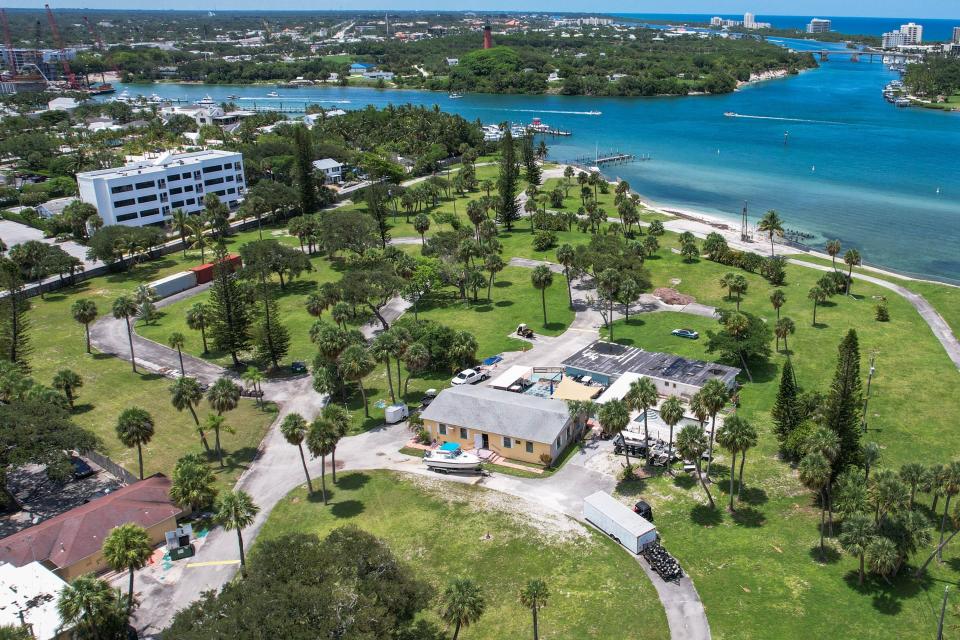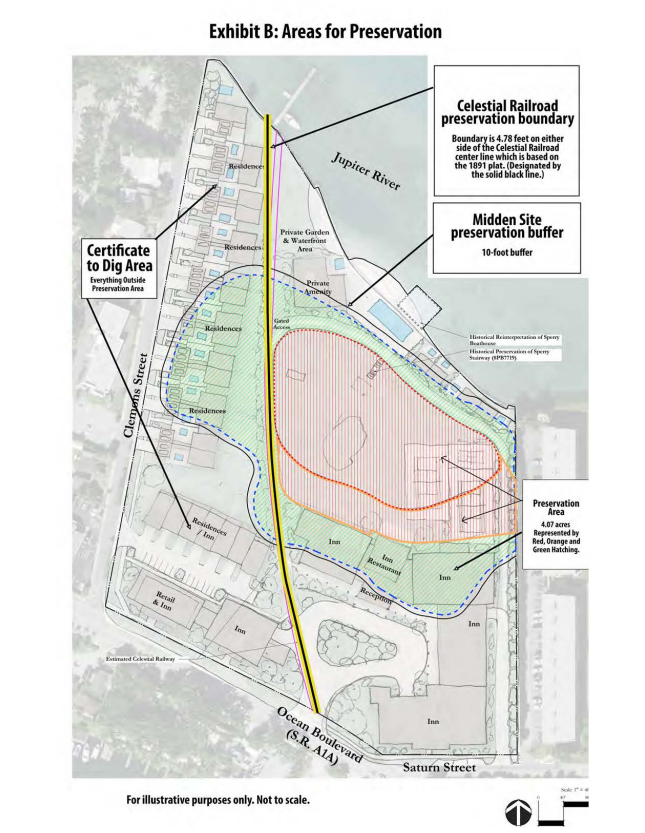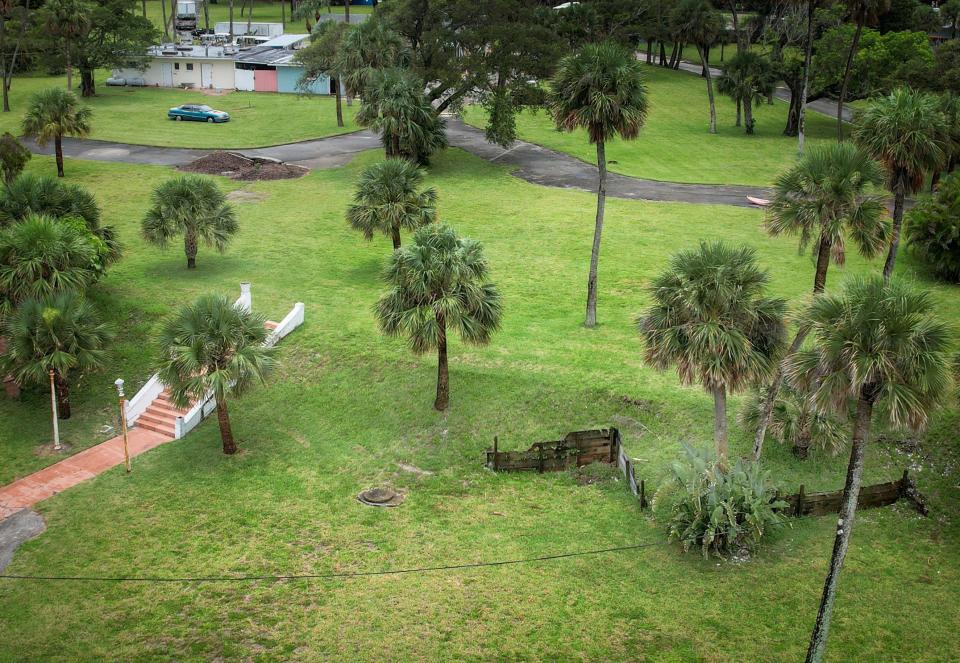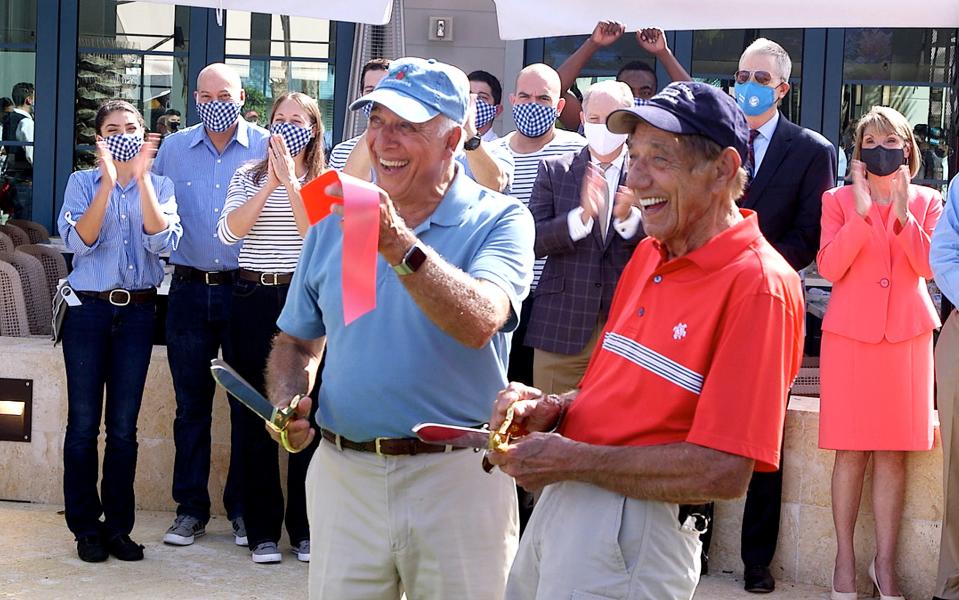Suni Sands owner fights Jupiter's limits on digging, saying they make hotel, condo plan 'impossible'
JUPITER — The town council’s decision to preserve 4 acres of the Suni Sands shell midden and the Celestial Railway right-of-way has made the entire 10-acre site undevelopable, attorneys for property owner Charles Modica said.
In a 109-page filing appealing the council’s decision, Howard Nelson, an attorney with Bilzin Sumberg of Miami, requested a hearing before a special magistrate, one both sides find acceptable to hear the case.
Town attorney Thomas Baird said this week the two sides had chosen Fort Lauderdale attorney Samuel Goren to serve as the magistrate and that no hearing date had been set. The town's formal response to Modica's request is due Sept. 8.
On July 25, the council voted 3-2 to approve a certificate to dig on 6 acres of the property along the Loxahatchee River near the Jupiter Inlet. The site is known as the first village in Jupiter where the Jeaga and Jobe Native American tribes lived at least 5,000 years ago.
How Jupiter is growing: Can developer build on a waterfront site that has historical significance?
The council set aside for preservation and protection the 4.07-acre Sun Sands Shell Midden, a 10-foot buffer around it, and the 950-foot-long, 9.56-foot-wide pathway where the Celestial Railway cut across the property starting in 1889.
“It goes without saying that the development order renders the proposed use of the property impossible,” Nelson said.
State law lets developers appeal 'unreasonable' development orders

The Florida Land Use and Environmental Dispute Resolution Act permits property owners to file a request for relief with the town where the municipality issues a development order that either is unreasonable or unfairly burdens the property’s owner, Nelson wrote in the brief.
The act states that the governmental agency, in this case the town of Jupiter, has 10 days from the receipt of the property owner’s request to select a mutually agreed-upon magistrate. This is typically a Florida attorney who specializes in land-use law. The request was submitted Aug. 21, which would place the deadline on Aug. 31.
The act, as detailed in Florida Statute 70.51, states that after the magistrate is selected, the magistrate must conduct a public hearing within 45 days unless the parties agree on a different date.
The magistrate hears from all parties and witnesses needed to understand the issue. After the hearing, the magistrate issues a recommendation, but the town can accept, modify or reject the nonbinding recommendation. The property owner can elect to file a lawsuit if the outcome is not as desired.
Modica is a Hobe Sound resident who built the Charley and Joe's Love Street restaurant complex just west of the Suni Sands site. In 2013, he purchased Suni Sands for $17 million after receiving a letter that July from the town planning and zoning staff advising him that the property could be developed.
Magistrate's ruling: County wrong to reject plan to turn Palm Beach International Raceway into warehouses
The land use designations were “High Density Residential” and “Riverwalk Flex.” The letter mentioned certain “residential bonus guidelines” that were to be followed. Modica’s due-diligence representatives met twice with the town staff, who confirmed the property could be developed subject to archaeological oversight, Nelson's filing said.
“Not once though does the letter mention or even allude to certain archaeological or historical sites impeding the development of the property or that the town intended to preserve all or a portion of the property,” Nelson stated.
Nelson and Philippe Jeck, Modica’s Juno Beach-based attorney, had no comment when reached last week.
Opponents of Suni Sands dig want site preserved from development
At the July 25 hearing, an angry crowd packed the council chambers and called for the entire 10 acres to be preserved. Native American activists, local residents and preservationists presented a united front and were vocal about it, booing, whistling and cheering.
The vote did not approve any development at Suni Sands that night but opened the door to allow the developers to submit plans and go through the normal development application process. The certificate to dig is required to ensure that any finds of archaeological significance are preserved and treated properly.
Mayor Jim Kuretski has said he is hopeful the town will ultimately be able to buy the site. That hinges on whether Modica decides he is willing to sell to the town and an agreement is reached. A town lobbyist has said the state may be able to provide money to help pay the purchase price.
Want more Jupiter news?
Sign up for our Post on Jupiter weekly newsletter, delivered every Thursday!
The town council’s vote followed the town’s Historic Resources Board’s March 13 decision that denied a dig permit and found that the entire 10.4 acres must be protected from development and preserved.
Modica has proposed a 125-room hotel, 72 condominiums and townhomes and about 12,000 square feet of restaurant and retail use. His current plans also propose a public space along State Road A1A paying homage to the Celestial Railway.
“Importantly, no part of the proposed development will disturb the principal mound,” Nelson stated.

“The owner contends that the property is prime for this kind of development given its location on the Loxahatchee River, just minutes from the beach and contiguity to residential neighborhoods,” Nelson stated.
A map shown at the July 25 meeting shows the protected area would be oval in shape and lie along part of the site's waterfront, extending from Saturn Street on the east to Clemens Street on the west north of State Road A1A.
The development order prevents any development or digging along the Celestial Railroad corridor, and the corridor bisects the property, essentially splitting it in half, Nelson said.
“Furthermore, the development order prohibits any development on the midden site or on a 10-foot buffer surrounding the midden site. This renders the entire property undevelopable, except for two small slivers in two corners,” Nelson stated in the filing.
Developer: Construction over decades already has altered Suni Sands

After Modica purchased the property, the Suni Sands mobile-home park that had long stood on the site was demolished, and an archaeologist conducted excavation tests for nine years, Nelson wrote.
The excavations did not reveal any Native American burial, grave or ritual sites, he said. That fact is confirmed by the archaeologist’s reports, which were reviewed and deemed sufficient by the town’s archeologist.
The council also failed to consider the fact that the site’s history and archaeology were altered by previous development, Nelson's report said. The first disturbance was the Celestial Railway’s construction, which cut a deep swath through the midden site, Nelson said.
The land was a vacation rental property from the 1930s to the 1960s. It then became a 130-unit mobile home park, and that included improvements such as paved roads, foundation slabs, utilities, an apartment building, a commercial building, a large swimming pool and other structures.

While Modica does not dispute the fact that the midden is an archeological site where indigenous people lived, his archaeological consultant found that only 2.09 acres of the midden site warrants preservation, Nelson stated.
Members of the Seminole and Miccosukee Tribes have stated at public hearings that their ancestors are likely buried at Suni Sands.
Historic artifacts and finds during 289 excavation tests Modica’s archaeologist conducted from 2014 to 2022 included 4,800 prehistoric ceramic pieces, a rare green stone hammer and an axe head, which shows there was trade with other communities to the north, as well as prehistoric skeletal or fossilized human remains, including seven human teeth and a knee cap.
This article originally appeared on Palm Beach Post: Jupiter faces fight from Suni Sands owner over dig limits at historic site

